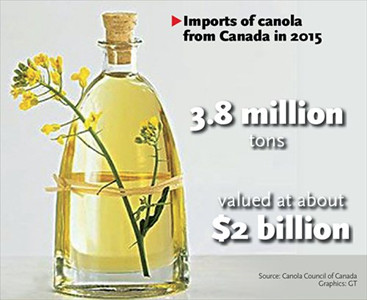
Graphics/GT
Authorities want to encourage domestic cultivation of crop: experts
China is standing firm on its insistence for higher standards of canola in negotiations with Canada, which shows the government's determination to regulate the sector by encouraging domestic production of the crop, experts told the Global Times on Tuesday.
According to a Reuters report on Friday, the Chinese government has been holding talks with Canada, which is trying to convince China to back off a plan to toughen its standard for Canada's canola shipments. However, the talks ended on Friday with China refusing to make a concession.
The two governments will continue to discuss the issue, the report said.
Canola, or rapeseed, is mainly used to produce vegetable oil.
Ma Wenfeng, an agriculture analyst with Beijing-based consulting company Beijing Orient Agribusiness Consultant Co, told the Global Times on Tuesday that China usually imports about 4 million tons of canola annually, mostly from -Canada and Mongolia.
China imported 3.8 million tons of canola valued at about $2 billion from Canada in 2015, according to a statement by the Canola Council of Canada in June.
"Imports of canola have been rising in recent years as overseas canola is cheaper than canola grown at home," Ma noted.
"This has been a blow to domestic canola farmers and caused domestic rape planting areas to shrink," said Ma.
According to a report by Jiangsu-based Xinhua Daily in February, there are about 200,000 hectares of rape fields in East China's Jiangsu Province this year, down from 467,000 hectares in 2015.
The area for cultivating rape in Central China's Hubei Province has fallen nearly 8 percent year-on-year in 2016, according to a statement by the Hubei provincial government in May.
Weng Ming, an agricultural product analyst, said that China's decision to increase the import standards on canola may have something to do with controlling imports and supporting domestic canola producers.
The General Administration of Quality Supervision, Inspection and Quarantine informed Ottawa in February that it would impose a stricter inspection standard for canola shipments, according to another Reuters report on August 10.
Starting on September 1, the standard will allow no more than 1 percent of extraneous plant material in each shipment of imported canola, down from the current level of about 2.5 percent, Reuters noted. Extraneous plant material is anything picked up during the harvest that is not canola, such as straw.
The Chinese government has been concerned that the extraneous matter might contribute to blackleg fungal disease, which can cause yield losses, according to the -Reuters report in August.
Overseas media have noted that the new standard will raise cleaning costs and risks, and that the tougher standard might cause losses to big Canadian canola exporters, such as Richardson International.
Richardson declined to comment when contacted by the Global Times on Monday.
Ma said that higher standards might influence Canadian canola exporters to a certain extent. However, he noted that the 1 percent standard is not high, as the level is already applied to many agricultural products domestically.
"I don't think the new requirement is very harsh or hard to meet for Canadian exporters," Ma said.
He also said that the requirement will bring benefits to the oil processing industry in general, as purer canola is easier to process and can be stored for a longer time.
"In the long term, with increasing industrialization in China, the country will still be short of land for agricultural production," Weng noted. "As a result, China will still depend on imports of food products such as canola."
An employee from the Canadian Embassy in China, who prefers to be unnamed, told the Global Times he was not familiar with the negotiation issue on Tuesday.
Canadian Prime Minister Justin Trudeau has made efforts to expand trade cooperation with China by pushing to sign a bilateral free trade deal, according to media reports.


















































